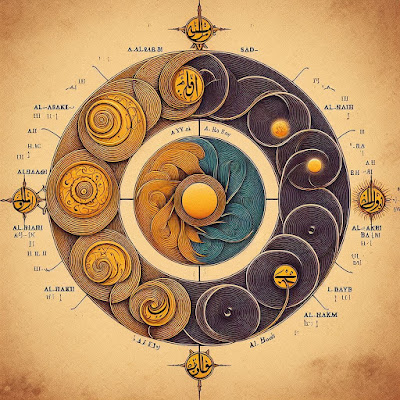Istishab: The Divine Philosophy of Continuity (Part I)
A Journey Through the Letters Ṣād, Ḥāʾ, and Bāʾ
Istishab, at face value, is a juristic principle meaning “presumption of continuity.” But when we dive into its root letters — Ṣād (ص), Ḥāʾ (ح), and Bāʾ (ب) — we discover a layered metaphysical current that flows through language, time, and Divine intent.
This post initiates a series unpacking Istishab not only as a legal theory but as a cosmic pattern of presence, deeply rooted in the Names of God.
Ṣād: The Root of Continuity, Patience, and Truth
In examining the letter Ṣād (صاد), we see that it plays a crucial role in the metaphysical framework of Istishab — the principle of continuity or the law of inertia in the spiritual realm. While Ṣād itself is not always directly represented in the canonical 99 Names of Allah, its associated attributes, Al-Ṣabūr (The Most Patient) and Al-Samad (The Eternal, The Sufficient), are central to understanding the divine qualities connected with this root.
The Names Linked with Ṣād:
-
Al-Ṣabūr (ٱلصَّبُور) – The Most Patient One
Al-Ṣabūr signifies divine patience, an attribute that is foundational to enduring and persevering in the face of challenges. Ṣabūr may not be explicitly listed in all the canonical 99 Names, but it appears in many spiritual discussions as an essential quality of Allah, reflecting divine resilience and wisdom throughout time.
-
Al-Samad (ٱلصَّمَد) – The Eternal, The Sufficient
Al-Samad is the one who is self-sufficient and the ultimate refuge for all creation. This name reflects Allah's independence from any need and His role as the eternal sustainer of the universe. Al-Samad is often included in Islamic teachings but may not always appear in every canonical list of 99 Names, yet its significance cannot be overstated.
Al-Ṣabūr (ٱلصَّبُور) – The Most Patient One
Al-Ṣabūr signifies divine patience, an attribute that is foundational to enduring and persevering in the face of challenges. Ṣabūr may not be explicitly listed in all the canonical 99 Names, but it appears in many spiritual discussions as an essential quality of Allah, reflecting divine resilience and wisdom throughout time.
Al-Samad (ٱلصَّمَد) – The Eternal, The Sufficient
Al-Samad is the one who is self-sufficient and the ultimate refuge for all creation. This name reflects Allah's independence from any need and His role as the eternal sustainer of the universe. Al-Samad is often included in Islamic teachings but may not always appear in every canonical list of 99 Names, yet its significance cannot be overstated.
Metaphysical Implication of Ṣād:
The letter Ṣād (صاد) embodies the law of metaphysical inertia — the unseen force that upholds the truth until it is revealed by actual evidence or divine will. In the constant flux of the world, Ṣād represents the force of continuity that ensures the persistence of truth, demonstrating that divine patience and the sustaining quality of Al-Samad keep reality anchored in its true nature.
The Abjad Order:
In the Abjad numerical system, each Arabic letter corresponds to a specific value. For Ṣād (صاد), the numerical value is:
-
Ṣād = 90
-
Al-Ṣabūr = 205 (comprising the values of each letter)
-
Al-Samad = 99
This order and value further emphasize the metaphysical role of Ṣād and its associated attributes. The number 90, associated with Ṣād, could be seen as reflecting stability and continuity in the unfolding of time and reality, while Al-Samad’s value of 99 resonates with the concept of divine sufficiency and completeness.
Ṣād in the Context of Istishab:
In Istishab, Ṣād represents the persistence of truth, with Al-Ṣabūr and Al-Samad symbolizing divine patience and sufficiency, respectively. Together, they affirm the law of continuity: reality remains unchanged by external forces unless divinely willed otherwise. The attributes of patience and sufficiency ensure that the truth, once established, is upheld and continuously manifest in the world.
2. Ḥāʾ (ح) – The Breath of Preservation
Here we find multiple canonical Divine Names beginning with Ḥāʾ. These are:
|
|---|
These Names describe the Divine’s unceasing living presence, protective nature, and moral constancy — exactly what istishab mirrors in human perception of divine or legal states.
3. Bāʾ (ب) – The Face of Emergence
Bāʾ confirmed by majority canonical lists, we have:
Each of these reflects an outward-facing continuity: seeing, evolving, extending, sustaining.
Bonus: The Weight of Al-Ṣamad (ٱلصَّمَدُ)
Though Ṣamad is not from the same root (ص-م-د), it is theologically adjacent — meaning the Self-Sufficient, the One to whom all turn, and who depends on none. It reinforces istishab’s cosmic resonance: that the state of divine continuity is never cut off, even when creation is.
In Summary
Istishab is not merely a legal device. It is an ontological trust — a reflection of God’s ongoing presence (Ḥayy), truth (Ḥaqq), patience (Ṣabūr), and sustenance (Bāqī). Through its root letters, we see how law reflects metaphysics, and how even mundane jurisprudence mirrors cosmic reality.
🧭 Next post in this series: We will explore Istishab as it appears in the Qur’an, mapping its concept across verses that uphold the principle of continuous states, whether in belief, creation, or divine decree.




Comments
Post a Comment